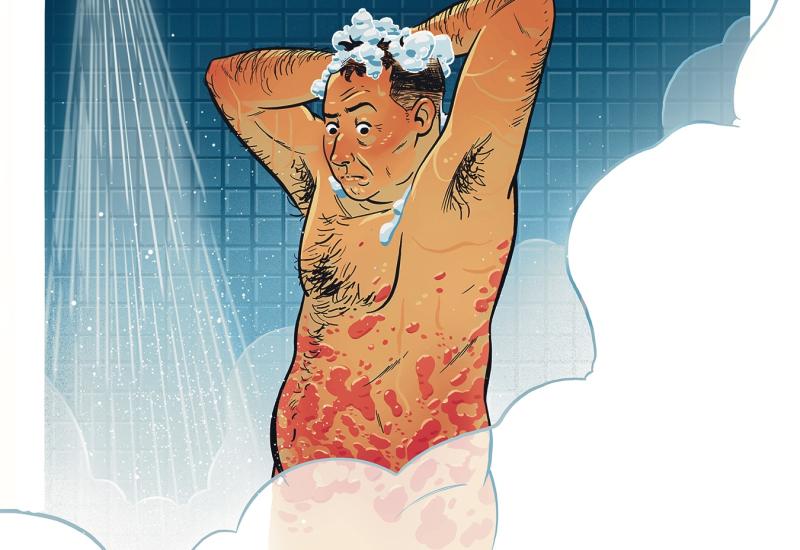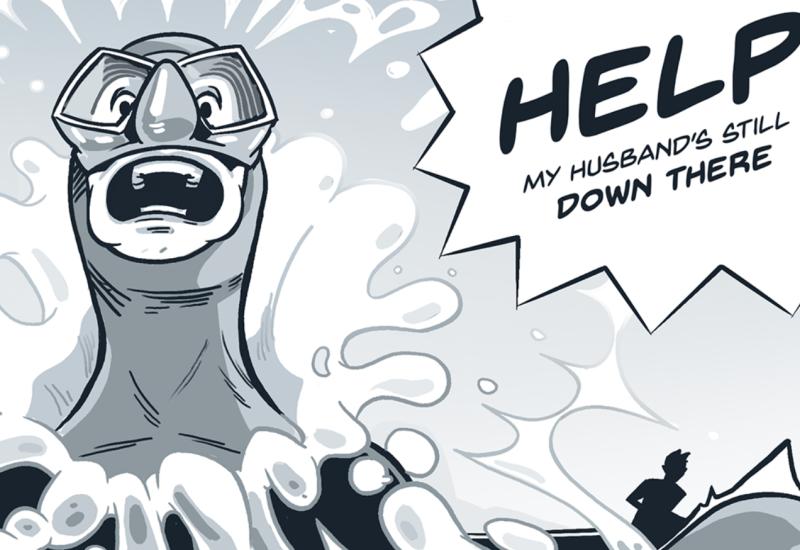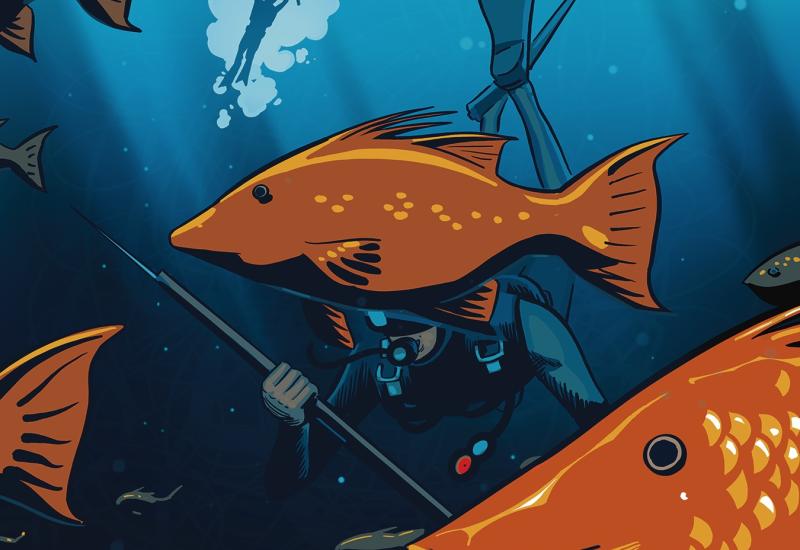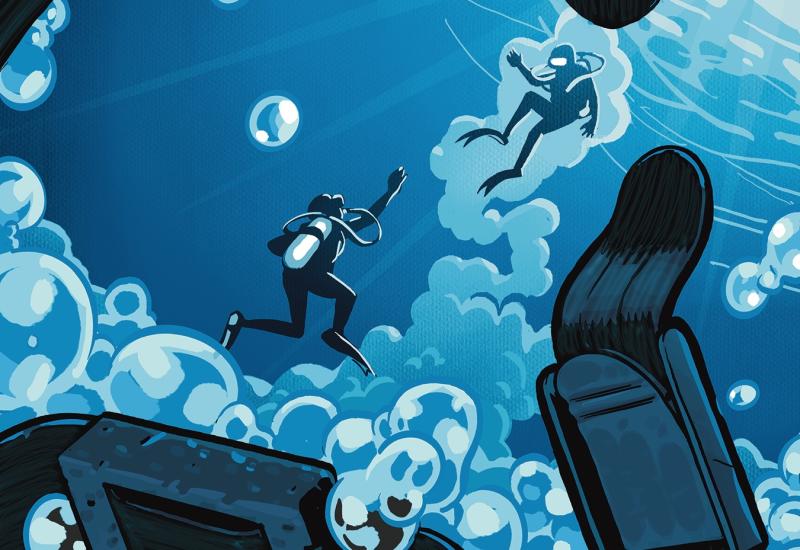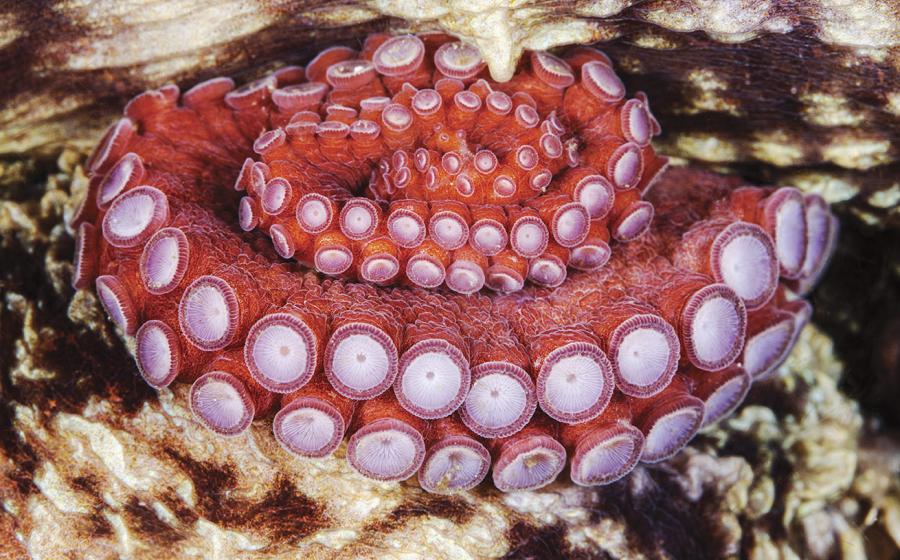Heads Up
When Matt came to, he looked up at the blue sky and felt the violent pitching of the boat as he lay on the deck. It hurt to breathe. Sharp pains stabbed his right side. He tried to sit up, but the mate pushed him back down. He could hear the crew calling for medical support and directing the other divers to secure their equipment. The details were still a little cloudy. The last thing Matt remembered was grabbing the bucking ladder to take off his fins when the large swells lifted him and the ladder out of the water, jamming the bottom rung into his rib cage. Then the wide swim step came crashing back down like a fin slapping the water, and everything went dark.
The Diver
Matt was a healthy, active diver in his mid-thirties. He was confident in his skills and very self-assured about his diving ability. He was also quite proud of having recently completed his divemaster certification.
The Dive
Matt traveled to South Florida with a large group of divers for a week of reef and wreck dives. Conditions were not great, and they got worse as the week wore on. On the third day of diving, the captain canceled the morning charter and told the divers to check back at noon. By midday, the seas had gone down slightly, and the group braved the three- to four-foot swells to reach a popular wreck site in about 85 feet of water. For this particular dive, the captain gave an additional briefing specific to the rough conditions and the dangers of boarding the boat in large swells. He made a point to tell the group to take their fins off on the trail line — before approaching the ladder — so they wouldn't get jerked around and possibly injured by the bouncing stern.
Matt wasn't working as a divemaster for the group, but he took on that role by helping the divers around him with their predive preparation. It was a nice gesture, but in doing so, he failed to pay attention to the briefing. He was part of a three-man buddy team, and after helping his partners into the water, he rapidly put on his own gear and jumped in the water to find one of his buddies had grown seasick bobbing in the rough seas. They immediately started their descent. Once the group reached the wreck, the seasick diver indicated that he felt better. But during their safety stop on the violently pitching anchor line he went green once again. Matt helped the sick diver to the surface. Swimming well clear of the vessel's hull, they made their way through the rising swells to the trail line behind the boat.
The Accident
Matt attempted to push the seasick diver toward the boat, but the buddy stopped several feet away to remove his fins. Matt assumed that the diver was confused and continued to push him toward the boat. Finally, the diver removed his fins while fending off Matt's assistance. He reached the ladder and climbed on the boat. The third member was already on board.
Matt grabbed the pitching ladder and, hanging on with one hand, reached down to remove his fins. The boat dropped into a swell, and Matt's foot slipped off the bottom rung of the ladder. As the boat came up with the next wave, the ladder kicked out, catching Matt in the ribs. He was knocked back and away from the boat as the platform plummeted down on top of him.
When the boat struck him a second time, Matt struggled to catch his breath and stay afloat. The mate standing on the platform jumped in the water, grabbed Matt and swam away from the deadly platform while holding onto the trail line. He carefully timed the low point of a trough and shoved Matt onto the platform and into the waiting hands of the captain. Two of the divers in the group helped the captain drag Matt — still in all of his equipment — onto the deck. Matt was stunned, disoriented and in a great deal of pain; the side of the boat hit his octopus so hard that it shattered and cut a hole in the side of his wetsuit, leaving cuts and bruises behind. As they removed Matt's gear, it became clear he had broken some ribs. In addition to his damaged octopus, the cummerbund of his BC was torn and his wetsuit was literally shredded in several places. Medical assistance was summoned to meet the boat at the dock. Matt was treated overnight at the local hospital for two broken ribs and a number of other cuts, bruises and minor injuries.
Analysis
Matt thought his newly earned divemaster certification replaced the need for the expert local advice the captain provided in his briefing. He also let his desire to help other divers interfere with the captain's briefing and as a result, jeopardized both his safety and the safety of others. Had Matt listened to the briefing, he would have known the preferred method for boarding this vessel in choppy seas: Without a "fins on" boarding ladder, the divers needed to remove their fins before climbing on board. But in the four-foot seas, the rear of the boat moved as much as eight feet vertically with every swell.
Recognizing this, the captain told the divers to stop on the trail line before getting too close to the boat and to maintain a firm grip on the line while they removed their fins. They were then to slip the fin straps over their wrists, pull hand over hand up the trail line and approach the rear of the boat as the platform bottomed out in a trough between waves. With regulators and masks in place, they were to firmly grab the ladder and not let go for any reason. They were all advised to crawl on their hands and knees to get onto the deck of the boat.
Matt missed this portion of the briefing. Even so, as a divemaster he should have recognized the hazards of the exit and sought belated guidance from the boat's crew at that point. He would later admit that he was so distracted with assisting the seasick diver that he hadn't taken the time to analyze the hazards the boat presented in rough seas. He also failed to heed the concerns of the seasick diver, who successfully managed to keep Matt from pushing him into the rear of the boat.
Even after Matt observed his dive buddy removing his fins in what he thought was an odd procedure, he failed to recognize the benefits of this exit strategy. Fortunately for Matt, he was knocked back away from the boat, and the injuries that resulted from his carelessness, although painful, were much less serious than the fractured skull or broken neck he would have gotten if the platform had hit him in the head.
Lessons For Life
Listen to the dive briefing. There is never a good exception to this rule.
Be humble. Don't let your dive education make you overly confident in your skills. A certification at any level is no replacement for common sense.
Take care of yourself first. Helping other divers is great, but you should not jeopardize your own safety to provide that assistance, or cause any additional harm to the diver you are helping.
Pay attention. Watch your surroundings and how the conditions impact your safety. Unusual circumstances often require unusual procedures.
When Matt came to, he looked up at the blue sky and felt the violent pitching of the boat as he lay on the deck. It hurt to breathe. Sharp pains stabbed his right side. He tried to sit up, but the mate pushed him back down. He could hear the crew calling for medical support and directing the other divers to secure their equipment. The details were still a little cloudy. The last thing Matt remembered was grabbing the bucking ladder to take off his fins when the large swells lifted him and the ladder out of the water, jamming the bottom rung into his rib cage. Then the wide swim step came crashing back down like a fin slapping the water, and everything went dark.
The Diver
Matt was a healthy, active diver in his mid-thirties. He was confident in his skills and very self-assured about his diving ability. He was also quite proud of having recently completed his divemaster certification.
The Dive
Matt traveled to South Florida with a large group of divers for a week of reef and wreck dives. Conditions were not great, and they got worse as the week wore on. On the third day of diving, the captain canceled the morning charter and told the divers to check back at noon. By midday, the seas had gone down slightly, and the group braved the three- to four-foot swells to reach a popular wreck site in about 85 feet of water. For this particular dive, the captain gave an additional briefing specific to the rough conditions and the dangers of boarding the boat in large swells. He made a point to tell the group to take their fins off on the trail line — before approaching the ladder — so they wouldn't get jerked around and possibly injured by the bouncing stern.
Matt wasn't working as a divemaster for the group, but he took on that role by helping the divers around him with their predive preparation. It was a nice gesture, but in doing so, he failed to pay attention to the briefing. He was part of a three-man buddy team, and after helping his partners into the water, he rapidly put on his own gear and jumped in the water to find one of his buddies had grown seasick bobbing in the rough seas. They immediately started their descent. Once the group reached the wreck, the seasick diver indicated that he felt better. But during their safety stop on the violently pitching anchor line he went green once again. Matt helped the sick diver to the surface. Swimming well clear of the vessel's hull, they made their way through the rising swells to the trail line behind the boat.
The Accident
Matt attempted to push the seasick diver toward the boat, but the buddy stopped several feet away to remove his fins. Matt assumed that the diver was confused and continued to push him toward the boat. Finally, the diver removed his fins while fending off Matt's assistance. He reached the ladder and climbed on the boat. The third member was already on board.
Matt grabbed the pitching ladder and, hanging on with one hand, reached down to remove his fins. The boat dropped into a swell, and Matt's foot slipped off the bottom rung of the ladder. As the boat came up with the next wave, the ladder kicked out, catching Matt in the ribs. He was knocked back and away from the boat as the platform plummeted down on top of him.
When the boat struck him a second time, Matt struggled to catch his breath and stay afloat. The mate standing on the platform jumped in the water, grabbed Matt and swam away from the deadly platform while holding onto the trail line. He carefully timed the low point of a trough and shoved Matt onto the platform and into the waiting hands of the captain. Two of the divers in the group helped the captain drag Matt — still in all of his equipment — onto the deck. Matt was stunned, disoriented and in a great deal of pain; the side of the boat hit his octopus so hard that it shattered and cut a hole in the side of his wetsuit, leaving cuts and bruises behind. As they removed Matt's gear, it became clear he had broken some ribs. In addition to his damaged octopus, the cummerbund of his BC was torn and his wetsuit was literally shredded in several places. Medical assistance was summoned to meet the boat at the dock. Matt was treated overnight at the local hospital for two broken ribs and a number of other cuts, bruises and minor injuries.
Analysis
Matt thought his newly earned divemaster certification replaced the need for the expert local advice the captain provided in his briefing. He also let his desire to help other divers interfere with the captain's briefing and as a result, jeopardized both his safety and the safety of others. Had Matt listened to the briefing, he would have known the preferred method for boarding this vessel in choppy seas: Without a "fins on" boarding ladder, the divers needed to remove their fins before climbing on board. But in the four-foot seas, the rear of the boat moved as much as eight feet vertically with every swell.
Recognizing this, the captain told the divers to stop on the trail line before getting too close to the boat and to maintain a firm grip on the line while they removed their fins. They were then to slip the fin straps over their wrists, pull hand over hand up the trail line and approach the rear of the boat as the platform bottomed out in a trough between waves. With regulators and masks in place, they were to firmly grab the ladder and not let go for any reason. They were all advised to crawl on their hands and knees to get onto the deck of the boat.
Matt missed this portion of the briefing. Even so, as a divemaster he should have recognized the hazards of the exit and sought belated guidance from the boat's crew at that point. He would later admit that he was so distracted with assisting the seasick diver that he hadn't taken the time to analyze the hazards the boat presented in rough seas. He also failed to heed the concerns of the seasick diver, who successfully managed to keep Matt from pushing him into the rear of the boat.
Even after Matt observed his dive buddy removing his fins in what he thought was an odd procedure, he failed to recognize the benefits of this exit strategy. Fortunately for Matt, he was knocked back away from the boat, and the injuries that resulted from his carelessness, although painful, were much less serious than the fractured skull or broken neck he would have gotten if the platform had hit him in the head.
Lessons For Life
Listen to the dive briefing. There is never a good exception to this rule.
Be humble. Don't let your dive education make you overly confident in your skills. A certification at any level is no replacement for common sense.
Take care of yourself first. Helping other divers is great, but you should not jeopardize your own safety to provide that assistance, or cause any additional harm to the diver you are helping.
Pay attention. Watch your surroundings and how the conditions impact your safety. Unusual circumstances often require unusual procedures.

